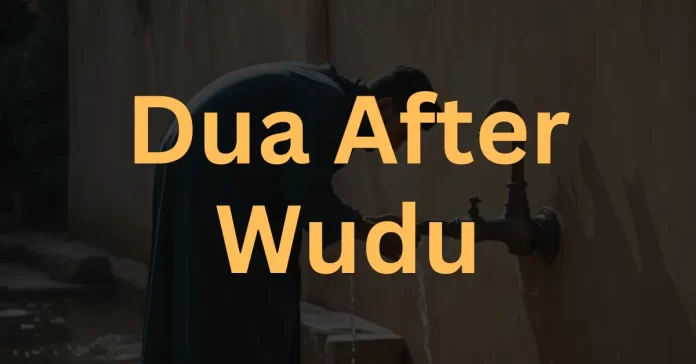Introduction to Dua After Wudu
In the intricate tapestry of Islamic rituals, each act holds profound significance, weaving together a deeper connection between the believer and the Divine. Among these acts, the purification ritual of wudu stands as a pivotal moment, symbolizing both physical cleanliness and spiritual renewal. Yet, beyond the physical motions lies a profound opportunity for spiritual elevation—the dua after wudu. In this exploration, we delve into the essence of this supplication, understanding its importance, its meanings, and the blessings it bestows upon the believer.
Understanding Wudu
Before delving into the significance of the dua after wudu, it’s imperative to grasp the importance of wudu itself. Wudu, or ablution, is a ritual purification performed by Muslims before various acts of worship, including Salah (prayer), Quranic recitation, and entering the mosque. Its significance lies not only in the physical cleansing but also in its spiritual symbolism. As narrated by Abu Huraira (may Allah be pleased with him), the Prophet Muhammad (peace be upon him) said, “When a Muslim, or a believer, washes his face (in the course of Wudu’), every sin which he committed with his eyes, will be washed away from his face with water, or with the last drop of water; when he washes his hands, every sin which is committed by his hands will be effaced from his hands with the water, or with the last drop of water; and when he washes his feet, every sin his feet committed will be washed away with the water, or with the last drop of water; until he finally emerges cleansed of all his sins.” (Sahih Muslim)
The Ritual of Dua After Wudu
Upon completion of wudu, Muslims are encouraged to offer a dua, or supplication, seeking blessings, forgiveness, and spiritual elevation. This dua serves as a moment of intimate connection with the Divine, a sacred pause in the midst of daily activities. The Prophet Muhammad (peace be upon him) emphasized the importance of this supplication, stating, “There is not one of you that makes wudu, and does so perfectly, and then says, ‘I bear witness that there is no god but Allah, alone, without any partner, and I bear witness that Muhammad is His slave and Messenger,’ except that the eight gates of the Garden are opened to him, and he can enter by whichever one of them he wishes.” (Muslim)
The Essence of Dua After Wudu
The dua after wudu encapsulates a myriad of spiritual aspirations. It is a moment of gratitude for the gift of purification, a recognition of one’s dependence on the Divine for spiritual cleansing. It is also a plea for forgiveness, acknowledging human fallibility and seeking Allah’s mercy and pardon. Additionally, the dua serves as a request for steadfastness in faith, beseeching Allah to grant strength and resilience in the face of life’s challenges. As Allah says in the Quran, “And when My servants ask you, [O Muhammad], concerning Me – indeed I am near. I respond to the invocation of the supplicant when he calls upon Me.” (Quran 2:186)
The Dua after wudu is the shahada.

English Translation – “I bear witness that none has the right to be worshipped but Allah alone, Who has no partner; and I bear witness that Muhammad is His slave and His Messenger.”
According to other sources there are 2 more Duas you can recite after finishing wudu. But the 2 mentioned above are the easiest to start using right now since already know them by heart.
- Transliteration: Allaahummaj’alnee minat-tawwaabeena waj’alnee minal-mutatahhireen. Translation: O Allah, make me among those who turn to You in repentance, and make me among those who are purified. (Source)
- Transliteration: Subhaanaka Allaahumma wa bihamdika, ‘ash-hadu ‘an laa ‘ilaaha ‘illaa ‘Anta, ‘astaghfiruka wa ‘atoobu ‘ilayk. Translation: Glory is to You, O Allah, and praise; I bear witness that there is none worthy of worship but You. I seek Your forgiveness and turn to You in repentance.
The Spiritual Significance
The dua after wudu holds profound spiritual significance, serving as a means of drawing closer to Allah and seeking His favor. It is a reminder of the transient nature of this world and the ultimate goal of attaining Paradise. Through this supplication, believers express their humility before the Creator, acknowledging their utter dependence on His grace and mercy. It also serves as a reminder of the importance of intention in worship, as each act is imbued with spiritual significance when performed with sincerity and devotion.
The Blessings of Dua After Wudu
The blessings bestowed upon the believer through the dua after wudu are manifold. Firstly, it serves as a means of spiritual purification, cleansing the heart and soul of impurities. It is also a source of divine protection, shielding the believer from evil and adversity. Moreover, the dua after wudu is a manifestation of trust in Allah’s promise of forgiveness and mercy, instilling hope and tranquility in the heart of the supplicant. As the Prophet Muhammad (peace be upon him) said, “When a servant of Allah performs wudu and does it well, his sins depart from his body, even from under his nails.” (Sahih Muslim)
Conclusion
In the hustle and bustle of daily life, it is easy to overlook the spiritual significance of seemingly mundane rituals. However, in Islam, even the simplest acts are infused with profound meaning and significance. The dua after wudu serves as a poignant reminder of this reality, offering believers an opportunity for spiritual elevation and divine connection. As we perform this sacred ritual, let us do so with mindfulness and sincerity, aware of the blessings it bestows and the spiritual journey it embarks us upon. Let us embrace the dua after wudu as a means of drawing closer to our Creator, seeking His forgiveness, mercy, and grace. And in doing so, may we find peace, fulfillment, and ultimate success in this world and the Hereafter.
Frequently Asked Questions about Dua After Wudu
1. What is dua after wudu?
Dua after wudu is a supplication that Muslims recite after completing the ritual of wudu, or ablution. It is a moment of intimate connection with the Divine, where believers seek blessings, forgiveness, and spiritual elevation.
2. Is dua after wudu obligatory?
Dua after wudu is not obligatory in Islam, but it is highly recommended. It is considered a Sunnah, following the example of the Prophet Muhammad (peace be upon him), who encouraged believers to recite supplications after completing acts of worship.
3. What should I say in the dua after wudu?
There are various supplications recommended to recite after wudu, including:
- The declaration of faith: “Ashhadu an la ilaha illallah, wa ashhadu anna Muhammadan ‘abduhu wa rasuluhu” (I bear witness that there is no god but Allah, and I bear witness that Muhammad is His servant and Messenger).
- Seeking forgiveness: “Allahumma-ghfirli dhambi wa wassi’li fi dari wa barikli fi rizqi” (O Allah, forgive my sins, expand my home, and bless my sustenance).
- Seeking entry to Paradise: “Allahumma iftah li abwaba rahmatika” (O Allah, open the gates of Your mercy for me).
4. What are the benefits of reciting dua after wudu?
Reciting dua after wudu carries numerous benefits, including:
- Spiritual purification: Dua after wudu serves as a means of cleansing the heart and soul, purifying the believer from sins and impurities.
- Divine protection: It is believed to invoke Allah’s protection from evil and adversity, safeguarding the supplicant in both this life and the Hereafter.
- Forgiveness and mercy: Dua after wudu is a plea for Allah’s forgiveness and mercy, acknowledging human fallibility and seeking His grace.
5. Can I make dua after wudu in any language?
Yes, dua after wudu can be recited in any language. While there are recommended supplications in Arabic, believers can also express their intentions, gratitude, and requests in their native language or any language they are comfortable with.
6. When should I recite dua after wudu?
Dua after wudu should be recited immediately after completing the ritual of ablution. It is a moment of spiritual elevation and connection, ideally performed before beginning any subsequent acts of worship or daily activities.
7. Can I make personal dua after wudu?
Yes, after reciting the recommended supplications, believers can also make personal dua, expressing their individual needs, aspirations, and desires to Allah. Personal dua is a deeply personal and intimate form of worship, allowing believers to communicate directly with their Creator.
8. Is there any specific etiquette for reciting dua after wudu?
While there is no strict etiquette for reciting dua after wudu, it is recommended to face the Qiblah (direction of the Kaaba in Mecca) if possible, as it enhances the sense of connection with the Divine. Additionally, reciting dua with humility, sincerity, and concentration amplifies its spiritual benefits.
9. Can I recite dua after wudu silently or aloud?
Dua after wudu can be recited either silently or aloud, depending on personal preference. Some prefer to recite it silently as a private conversation with Allah, while others may choose to recite it aloud for added focus and concentration.
10. How can I incorporate dua after wudu into my daily routine?
Incorporating dua after wudu into your daily routine is simple. Make it a habit to recite the supplications immediately after completing ablution, whether at home, work, or the mosque. By consistently practicing this Sunnah, you can strengthen your spiritual connection and experience the blessings of dua after wudu in your daily life.

